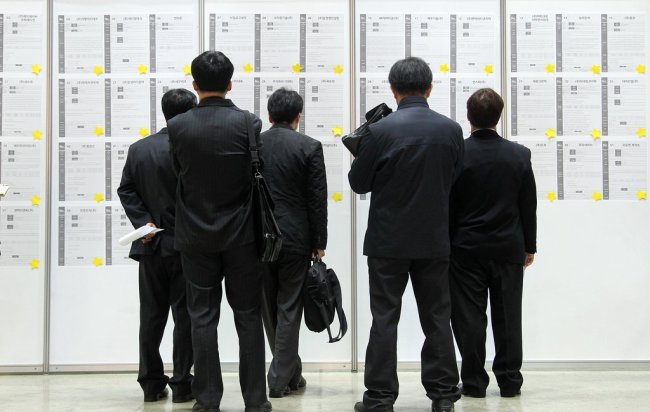Korea cuts growth estimate, set to spend more for underprivileged
By YonhapPublished : July 18, 2018 - 11:25
South Korea's government plans to increase spending to create more jobs and expand the social safety net, as Asia's fourth-largest economy is set to lose its steam down the road in the face of rising uncertainties, including the growing trade war between major economies and a slowdown in facility investment, Seoul's finance ministry said Wednesday.
Charting out its second-half economic policy plans, the ministry cut its growth estimate to 2.9 percent this year from its earlier projected 3 percent and sharply slashed its job creation target to 180,000 from its earlier estimated 320,000.
Last year, the economy expanded 3.1 percent. The ministry's latest growth revision is on par with the Bank of Korea's growth forecast. The central bank also shed its growth estimate to 2.9 percent from its earlier 3 percent projection.

"With facility investment remaining sluggish, risks at home and abroad, such as the escalating US-China trade conflict and rising oil prices, are expected to increase, causing a recovery in exports and private spending to slow down," the ministry said.
As a step to help facilitate investment, as well as support senior citizens and low-income earners, the government will additionally spend 4 trillion won ($3.55 billion) in the second half of the year through state-run funds and firms.
A huge chunk of the earmarked money, estimated at slightly over 3 trillion won, will be spent to nurture key industrial sectors, finance supports for the underprivileged class and corporate restructuring-hit industries, according to the ministry.
The ministry also said it would maintain the expansionary fiscal spending stance in a bid to help the economy maintain its recovery pace.
According to the ministry, the growth of budget spending is set at 7.1 percent for 2018 and 5.7 percent for 2019. During the 2020-21 period, the expansion rate is set in the roughly low 5 percent range.
A 5.8 percent expansion of budget spending is set for the next five years, but the government is working to review the rate with the aim of resolving various issues.
According to the ministry, the country's facility investment is expected to increase 1.5 percent this year, sharply slowing down from last year's 14.6 percent on-year rise. Construction investment is forecast to decline 0.1 percent this year, a turnaround from last year's 7.6 percent expansion.
Private spending, a major pillar of the country's economic expansion, is projected to increase 2.7 percent this year, slightly higher from last year's 2.6 percent rise.
The government also plans to accelerate deregulation moves, which the government sees as vital to creating more jobs.
As part of efforts to support the underprivileged and expand the social safety net, the government will increase the amount of tax refunds for low-income households and the beneficiaries.
In particular, to help cushion their difficulties, the government will sharply expand the recipients of the earned income tax credit scheme that calls for refunding taxes to low-income families and the volume of its financial supports, according to the ministry.
In a bid to support the senior citizens, the country will also advance its plan to subsidize those who are aged 65 and older and belong to the bottom 20 percent in the income bracket starting next year as it seeks to expand its basic pension program.
The government will also seamlessly push for expanding the basic pension program for senior citizens who belong to the bottom 70 percent of the income bracket.
In such an effort, it will begin to pay 300,000 won to the elderly in the bottom 20 percent of the income bracket starting next year, two years earlier than its original plan, and raise the basic pension payment to 250,000 won from the current 210,000 won starting in September this year.
The government will also expand the scope of recipients of unemployment insurance, according to the ministry.
To reduce the burden on small shop owners, the government will seek to prod card firms to cut commission rates charged on them and maintain 3 trillion won worth of financial support into next year to reduce their increased costs that stem from a hike in the country's minimum wage hike.
Such support measures came as smaller firms and neighborhood shops, such as convenience stores, strongly criticize the increase in wage costs.
Last week, the Minimum Wage Council -- a panel comprised of representatives from labor, management and the general public -- decided to raise the minimum wage for next year to 8,350 won per hour, up 10.9 percent from this year.
This is the first time in history that the country's minimum wage will surpass the 8,000 won mark.
The Moon Jae-in administration increased the minimum wage for all workers by 16.4 percent this year to 7,530 won from 6,470 won in 2017, after setting a goal of raising hourly pay to at least 10,000 won by 2020.
The government claims the hike is aimed at income-led economic expansion and a reduction of the pay gap between workers, but critics argue that the increase is hurting entry-level jobs and weighing down the local economy. Also, small business owners are complaining about sharply rising labor costs.
The government is preaching for the policy of "income-driven growth" that calls for a virtuous cycle of increasing household income and spending.
But job growth remained poor as the number of newly created positions stayed slightly above 100,000 per month for the fifth straight month in June, the worst job data since the 2008 global financial crisis.
Some critics claim that the rise in wage costs is in part behind the worse-than-expected job additions. (Yonhap)










![[Today’s K-pop] BTS pop-up event to come to Seoul](http://res.heraldm.com/phpwas/restmb_idxmake.php?idx=644&simg=/content/image/2024/04/17/20240417050734_0.jpg&u=)
![[Graphic News] More Koreans say they plan long-distance trips this year](http://res.heraldm.com/phpwas/restmb_idxmake.php?idx=644&simg=/content/image/2024/04/17/20240417050828_0.gif&u=)
![[KH Explains] Hyundai's full hybrid edge to pay off amid slow transition to pure EVs](http://res.heraldm.com/phpwas/restmb_idxmake.php?idx=644&simg=/content/image/2024/04/18/20240418050645_0.jpg&u=20240419100350)





![[KH Explains] Hyundai's full hybrid edge to pay off amid slow transition to pure EVs](http://res.heraldm.com/phpwas/restmb_idxmake.php?idx=652&simg=/content/image/2024/04/18/20240418050645_0.jpg&u=20240419100350)

